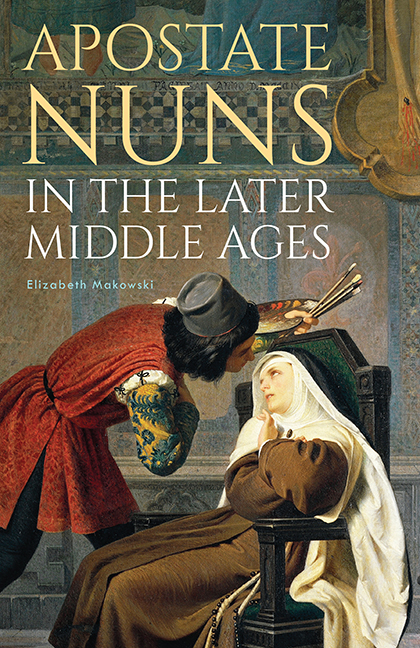Book contents
- Frontmatter
- Contents
- Preface
- Acknowledgements
- List of Abbreviations
- Introduction
- Part I The Vowed Life
- Part II Casting Off the Habit of Religion
- Part III Prodigals Return
- 5 Penitents and Penalties
- 6 Recidivists and Renegades
- Conclusion
- Bibliography
- Index
- Other volumes in Studies in the History of Medieval Religion
5 - Penitents and Penalties
from Part III - Prodigals Return
Published online by Cambridge University Press: 18 September 2019
- Frontmatter
- Contents
- Preface
- Acknowledgements
- List of Abbreviations
- Introduction
- Part I The Vowed Life
- Part II Casting Off the Habit of Religion
- Part III Prodigals Return
- 5 Penitents and Penalties
- 6 Recidivists and Renegades
- Conclusion
- Bibliography
- Index
- Other volumes in Studies in the History of Medieval Religion
Summary
Abraham, a play by the tenth-century canoness Hrotsvit of Gandersheim, is the story of the fall and repentance of the wayward anchoress, Mary. Prompted by her uncle and spiritual father, the hermit Abraham, Mary enters her anchor-hold at the tender age of seven. Twenty years of model behavior follow, but when she is seduced by a false monk she runs away and despairing because of her lost virginity, prostitutes herself. The catalyst for her early dedication to God, Abraham remains steadfast in his resolve to return Mary to His service. Having failed to engineer it at a remove, he forces himself to leave the peace of his hermitage, travel to a teeming city, and even enter a brothel disguised as a potential client, in order to do so. Mary is overwhelmed by his devotion and Abraham is rewarded with her penitent promise, made as she is led back to her cell, “Out of my own free will I shall remain contrite, I shall persist in my penance with all my might, and even if I lose the ability to perform the act, the will to it shall never lack. Let us return and hurry our way, let us hurry, I am weary of delay.”
Like Mary, some apostate nuns actually welcomed return to their monasteries. After years spent wrestling with an uneasy conscience, a prodigal might cooperate fully with efforts to bring her back to her community. When a repentant runaway found herself at a considerable distance from that community, an effort akin to Abraham's might be required to effect it. In Johannes Busch's long, detailed, mildly amusing and blatantly self-congratulatory account of one such return, the journey appears to have been more daunting for the shepherd than for the lost sheep. A detailed summary of this narrative follows, since it contains observations about the reintegration of penitent apostates relevant in a number of other cases.
Gertude Gensen, a young well-born nun from the Augustinian house of Marienwerder, just north of Hanover, fled her monastery in the middle of the night. Donning secular clothes of the same sort she used to wear at home in her castle, and leaving her habit behind in the choir, she traveled far; first through Westphalia and then all the way to Deventer in Utrecht. Once there, however, she had a change of heart.
- Type
- Chapter
- Information
- Apostate Nuns in the Later Middle Ages , pp. 137 - 158Publisher: Boydell & BrewerPrint publication year: 2019

